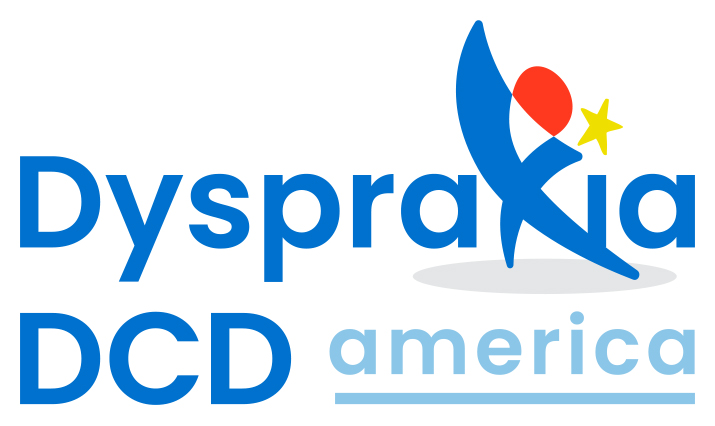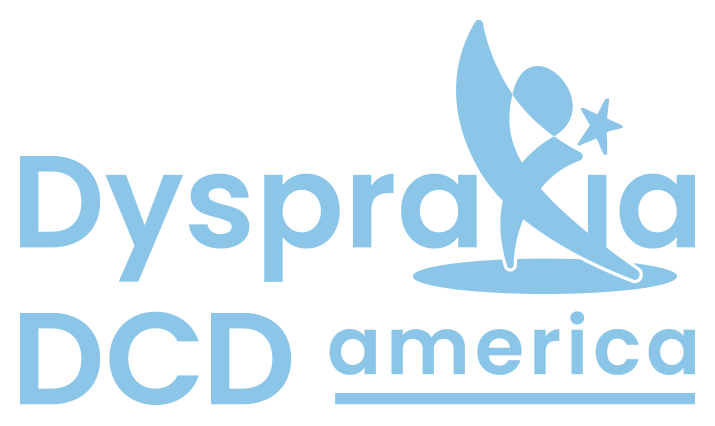FAQ
FAQ responses were reviewed by Priscila Tamplain, Ph.D., Director of the Motor Development Lab in Arlington, Texas.
Unfortunately, we don’t have a list of healthcare professionals that diagnose and treat individuals with Dyspraxia/DCD; that is a resource that we’re currently developing and plan to provide in the future.
Unfortunately, we don’t have a list of schools that specialize in educating students with DCD/Dyspraxia; that is a resource that we’re currently developing and plan to provide in the future.
Each school district is different, but most districts require their own evaluations, then accommodations will be discussed. Children will either have a 504 Plan or an Individualized Education Plan (IEP) depending on the range and level of support required.
The best treatments for Dyspraxia/DCD and overlapping conditions, with or without an official diagnosis, are therapies that support the individual’s needs. An occupational therapist (OT) helps develop fine motor skills used in everyday activities at home, school and work. A physical therapist (PT) uses exercises and equipment to help develop gross motor skills.
Research has shown that the most effective approaches used by OTs and PTs for improving motor skills are individualized, task-oriented methods such as the Cognitive Orientation to daily Occupational Performance (CO-OP) and Neuromotor Task Training (NTT) (Blank et al., 2019).
Yes! It is common for someone to have more than one neurodevelopmental disorder. Some of the conditions that may overlap with Dyspraxia/DCD include:
- ADHD (a condition characterized by difficulty with inattention, impulsivity, and hyperactivity)
- Specific Language Disorder or Impairment/Developmental Language Disorder (difficulty learning, understanding, and using language)
- Dyslexia (significant difficulty with the speed and accuracy of word decoding/reading)
- Dysgraphia (difficulty with the mechanics of writing) (Lino and Chieffo, 2022).
More studies are needed; however, research has shown that there is most likely a genetic component to Dyspraxia/DCD and so may possibly be inherited.
There is no established procedure for an adult diagnosis, but the process is similar to the process described for children, except that a pediatrician would not be involved. It’s important to note that any diagnosis of Dyspraxia/DCD should include confirmation of a history of motor difficulties in childhood that have continued into adulthood.
A good place to start is to bring up the possibility of Dyspraxia/DCD to a neurologist or another healthcare professional who specializes in movement disorders (including an OT or PT). Like the diagnosis process for children, it’s important for the diagnosing healthcare professional to exclude any other possible causes of coordination issues.
In the United States, there is not an established process or set of guidelines for obtaining a diagnosis. A good way to begin is to bring up the possibility of Dyspraxia/DCD to your child’s physician. Ideally, the process should involve healthcare professionals including a physician, an occupational therapist (OT) and/or a physical therapist (PT). The type of physician to provide a diagnosis could be a pediatrician, a developmental pediatrician, a neurologist, or another healthcare professional who can conduct developmental and neurological exams, rule out other possible causes of coordination difficulties and eventually diagnose Dyspraxia/DCD.
The diagnosing healthcare professional will review results of motor evaluations conducted by an OT and/or PT. The most common tests to assess motor skills are the Movement Assessment Battery for Children and the Bruininks-Oseretsky Test of Motor Proficiency. Diagnostic criteria from one of two main sources will be used: 1) the Diagnostic and Statistical Manual of Mental Disorders, Fifth Edition, (DSM-5) criteria for Developmental Coordination Disorder (DCD), or 2) the International Classification of Diseases, 11th Revision (ICD-11) criteria for Developmental Motor Coordination or Developmental Dyspraxia.
Yes. A diagnosis guides treatment and it helps the child or adult and their family understand what the individual is experiencing, why certain motor difficulties and related behavior issues are occurring and learn strategies to address them. A diagnosis may also facilitate access to medical and educational services and support. Finally, it may come as a relief to someone who may have been perceived as “not trying” or “being lazy” to have a name for the struggles they’ve endured and a plan for developing coping strategies moving forward.
Dyspraxia/DCD is a common neurodevelopmental disorder that is diagnosed when an individual has difficulty learning and performing motor skills used in everyday life. The individual may have difficulty with small, or fine, motor skills involved in dressing, writing or using eating utensils and/or large, or gross, motor skills involved in ball skills or riding a bike. Academic and work performance are also affected by these motor difficulties.
Although motor skill difficulties are central to the diagnosis of Dyspraxia/DCD, individuals may appear to have very different symptoms from one another. Some may have more difficulty with fine motor skills while others may struggle primarily with gross motor skills. Some individuals are severely affected, while others may have moderate or mild symptoms. Further, symptoms may vary, with an individual having some days that are better than others.
This variability adds to the difficulty in identifying and diagnosing Dyspraxia/DCD. However, even for those with mild symptoms, a diagnosis can be an important key to obtaining proper support and having the opportunity to live up to one’s full potential.
More research in teens and adults is needed, but studies have shown that the difficulties associated with Dyspraxia/DCD do continue beyond childhood (Blank et al., 2019). Activities of daily life may be affected, including learning how to drive. Research has shown, however, that early identification and treatment are important to helping individuals live to their full potential educationally, socially, and professionally.
References
Blank R, Barnett AL, Cairney J, Green D, Kirby A, Polatajko H, Rosenblum S, Smits-Engelsman B, Sugden D, Wilson P, Vinçon S. International clinical practice recommendations on the definition, diagnosis, assessment, intervention, and psychosocial aspects of developmental coordination disorder. Dev Med Child Neurol. 2019 Mar;61(3):242-285.
Lino, F.; Chieffo, D.P.R. Developmental Coordination Disorder and Most Prevalent Comorbidities: A Narrative Review. Children 2022, 9, 1095.


